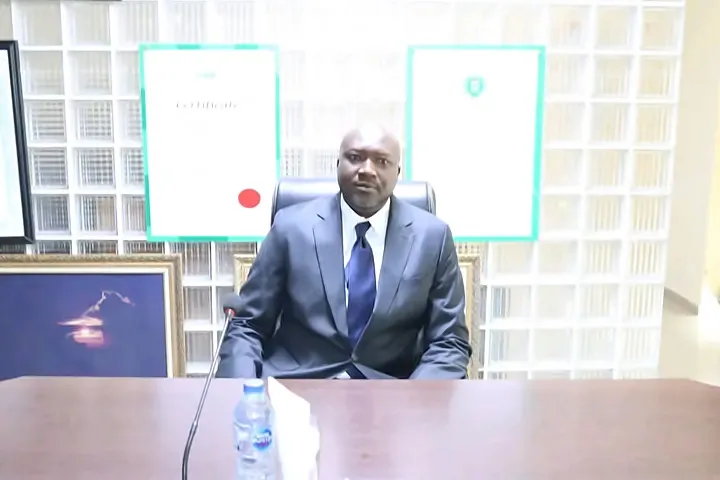General
COVID-19: Experts Advocate Collective Approach to Public Affairs Function

Communications and Public Affairs experts have advocated for collective and strategic engagement efforts to mitigate the negative effects of COVID-19 on businesses and governance.
They also emphasised that Public Affairs function as a management function has become the new deal breaker for organizations that want to thrive during this COVID-19 crisis period.
These were some of the resolutions advanced at a webinar held on June 10, 2010 and hosted by Re-Ignite Public Affairs Limited with the theme Managing the Public Affairs Function Post COVID-19.
The carefully selected panellists who are authorities in the field of communications, government relations, stakeholders’ engagement, financial communication, policy research and analysis representing various sectors shared their experiences with hundreds of participants from across the continent.
They included Sade Morgan, Corporate Affairs Director, Nigerian Breweries Plc; Ade Adefeko, Vice President, Corporate & Government Relations, Olam Nigeria; Emeka Oparah, Vice President, Communications & Corporate Social Responsibility, Airtel Nigeria; and Olufemi Awoyemi, Founder/ Chairman Proshare Nigeria.
The session was anchored by the President of African Public Relations Association APRA and Group Managing Director of CMC Connect Limited (Perception Managers), Yomi Badejo-Okusanya.
The panellists emphasized how core programmes under the Public Affairs function have become handy in moving businesses forward, engaging various stakeholders, creating corporate relevance and reinforcing brand equity in the face of the lockdown due to the COVID-19 pandemic.
Speaking on the effect of the lockdown on her organisation, Sade Morgan, Corporate Affairs Director, Nigerian Breweries Plc described their experience in terms of “the good, the bad and the ugly”.
“This period has challenged the organizations to work differently with stakeholders. We have seen a lot of changes in the way we work; going digital as a country and this has brought about a lot of efficiency.
“This crisis has particularly put corporate affairs at the heart of the business, because we came in strategically to being at our optimal best for the growth of the business.
“By engaging our external stakeholders, we are securing business continuity in different ways; we are delivering communications on various internal engagement platforms to keep our human capital motivated,” she said.
With regards to Government Relations “we need to understand that government cannot do it all. To drive business continuity and keep economic activity going, Public Affairs role is to ensure that government has full visibility of what is going on with us in the private sector” Morgan pointed.
In his own submission, Olufemi Awoyemi, Founder/Chairman of Proshare Nigeria posited that the Public Affairs function, during this pandemic, has been at the heart of some of the most important issues of the day.
With lives at stake, the private sector has worked closely with government, which has been in a full listening mode, to address the challenge of lives at stake and livelihood palliatives to be delivered through such private sector led coalitions like the CaCOVID. Those who did nothing will be called out at a later date, he said.
“This is a teachable moment for anyone involved in the craft to understand that the rules of the game has been rewritten already and that public communications is back as No. 1, and that enhanced state involvement is here to stay. Putting a dedicated person in charge of governmental affairs reflects or engaging a dedicated Public Affairs professional is the best understanding that to get anything done now, and in the future, will require government engagement. For the professionals, this is a two-way street that is less travelled.
“For the Public Affairs function, it is now, more than ever before, about reputation management (not brand management) and being a deal broker; a minder for the firm”, Awoyemi stated.
For Ade Adefeko, Vice President, Corporate & Government Relations, Olam Nigeria, lobbying and engagement are key to business survival. “There is nothing that you need to get done in the future that will not require government engagement,” he said.
Adefeko debunked the wrong notion equating lobbying as bribery. “Lobbying is an accepted engagement tool that must be done professionally without pecuniary consideration. I have been doing this successfully for years.
“To do it effectively, you must bear in mind the end game from the beginning. Your objective must be defined, and your communication specific. Your set goals to what needs to be achieved must be highlighted.
“However, there is need for public affairs professionals to understand the mandate of government agencies for them to be able to design appropriate strategies in engaging the government”, Adefeko advised.
While Emeka Oparah, Vice President, Communications & Corporate Social Responsibility, Airtel Nigeria, charged public affairs managers to collaborate and coordinate at this trying time.
“This period has taught us to engage more, we can exchange contacts and resources. As a public Affairs person you should know what you want and where to go and get it. You should have a network of people of influence within your network.
“There is need for you to understand your organization and its people in order to be able to articulate issues for seamless business operations,” he said.
The moderator Badejo-Okusanya cued in some participants for their views and they included, Abdul Waheed Patel, Chief Executive Officer of Ethicore Political Lobbying, South Africa; Temitope Oguntokun, Director, Corporate Affairs + Legal at ABinbev; Tony Ojobo, immediate past Public Affairs Director of Nigerian Communications Commission (NCC); and Anthony Chiejina. Group Head, Corporate Communications for Dangote Group.
All panellists also agree that relationship management is key for a successful Public Affairs function and network of influence are part of critical success factors for Public Affairs practitioner.
Participants thoroughly enjoyed and indicated interest in participating in future public affairs webinars by Reignite Public Affairs.
General
NIMASA Rallies Stakeholders’ to Develop National Action Plan

By Adedapo Adesanya
The Nigerian Maritime Administration and Safety Agency (NIMASA) has pledged its commitment to provide the regulatory leadership, technical coordination, and stakeholder engagement required to successfully develop and implement a robust National Action Plan on maritime decarbonization in Nigeria.
The Director General of the agency, Mr Dayo Mobereola, made this known during the National Stakeholders’ workshop on the development of a National Maritime Decarbonization Action Plan, further describing the workshop as a critical step in actualising the Federal Government’s blue economy and climate objectives.
Represented by the Executive Director, Operations, Mr Fatai Taiye Adeyemi, the NIMASA DG underscored the significance of the IMO GreenVoyage2050 Project, a technical cooperation initiative /designed to support developing countries in implementing the IMO GHG Strategy.
According to him, the National Action Plan being developed will reflect national realities, leverage existing capacities, address identified gaps, and align with broader economic and environmental priorities of the federal government.
Mr Mobereola stressed that “this transition is not merely about compliance with international obligations, it is about safeguarding our marine environment, protecting public health, strengthening the blue economy, and ensuring that our maritime industry remains competitive and future-ready”, the DG said.
Also speaking at the event was the Technical Manager of the IMO GreenVoyage2050 Project, Ms Astrid Dispert, who highlighted that the overarching objective of the initiative is to advance a coherent and globally aligned regulatory framework to accelerate maritime decarbonization.
She also emphasised that NIMASA plays a pivotal role in driving the project at the national level.
The IMO GreenVoyage2050 Project provides technical expertise and institutional support to assist countries in developing and implementing National Action Plans that promote sustainable shipping practices, encourage investment in clean technologies, and strengthen capacity for long-term emissions reduction.
Through this collaboration, the federal government is advancing deliberate steps towards maritime decarbonization, reinforcing its commitment to global climate goals and ensuring a cleaner, greener, and more sustainable future for the sector.
General
BPP Mandates Digital Submission for MDAs From March 1

By Adedapo Adesanya
The Bureau of Public Procurement (BPP) has directed all Ministries, Departments and Agencies (MDAs) to comply with its digital submission process effective March 1.
The directive was contained in a circular signed by the Director-General of the Bureau, Mr Adebowale Adedokun, noting that the move was part of the bureau’s commitment to digital transformation and paperless governance.
It explained that the transition followed an earlier circular of Aug. 4, 2025, which introduced electronic submission procedures.
According to the bureau, it has successfully moved from physical filings to a dedicated e-mail service for document submissions and is now advancing to a more robust and integrated system.
The circular announced the inauguration of the BPP Digital Submission Portal, a web-based platform designed to enable MDAs submit procurement-related documents directly to the Bureau.
It stated that the automated platform would streamline the submission process, enhance transparency and ensure accelerated tracking of procurement-related documents and petitions.
“With effect from March 1, all MDAs will be required to use the portal to submit requests for ‘No Objection’ Certificates, approvals for ‘No Objection’ for special procurements, clarifications and status updates on submissions,” the bureau said.
It added that the portal would be hosted on the Bureau’s official website and would become fully operational from the effective date.
The bureau warned that physical submissions or manual hand-deliveries would no longer be prioritised and would eventually be rejected following the full transition to the digital platform.
It urged accounting officers to brief their procurement departments and ICT units on the development to ensure seamless processing of procurement activities from March 1.
It further advised MDAs to contact the Bureau via its official email for information on the onboarding process and integration into the portal.
The bureau emphasised that full compliance by all MDAs was required to ensure a smooth transition and avoid delays in the implementation of the 2026 fiscal year procurement processes.
General
Senate Seeks Removal of CAC Boss Hussaini Magaji

By Adedapo Adesanya
The Senate has asked President Bola Tinubu to remove the Registrar General of the Corporate Affairs Commission (CAC), Mr Hussaini Ishaq Magaji, from office.
The Senate Committee on Finance, while passing a resolution in Abuja on Thursday, accused Mr Magaji, a Senior Advocate of Nigeria (SAN), of failing to honour the Senate’s invitations to account for the finances of his agency.
“He refused on so many occasions to honour our invitation to appear before this committee.
“We have issues with the reconciliation of the revenue of CAC.
“Each time we invite him, he gives us excuses,” the Chairman of the committee, Mr Sani Musa, said as the committee passed the resolution.
CAC was part of a group of agencies that the House of Representatives Public Accounts Committee (PAC) recommended zero allocation for the year 2026, for allegedly failing to account for public funds appropriated to them.
The committee, at an investigative hearing held two weeks ago, accused CAC and some other ministries, departments and agencies (MDAs) of shunning invitations to respond to audit queries contained in the Auditor-General for the Federation’s annual reports for 2020, 2021 and 2022.
The PAC chairman, Mr Bamidele Salam, stated that the National Assembly should not continue to appropriate public funds to institutions that disregard accountability mechanisms, saying this will create fiscal discipline and strengthen transparency across federal institutions and conform with extant financial regulations and the oversight powers of the parliament.
“Public funds are held in trust for the Nigerian people. Any agency that fails to account for previous allocations, refuses to submit audited accounts, or ignores legislative summons cannot, in good conscience, expect fresh budgetary provisions. Accountability is not optional; it is a constitutional obligation,” he said.
-

 Feature/OPED6 years ago
Feature/OPED6 years agoDavos was Different this year
-
Travel/Tourism10 years ago
Lagos Seals Western Lodge Hotel In Ikorodu
-

 Showbiz3 years ago
Showbiz3 years agoEstranged Lover Releases Videos of Empress Njamah Bathing
-

 Banking8 years ago
Banking8 years agoSort Codes of GTBank Branches in Nigeria
-

 Economy3 years ago
Economy3 years agoSubsidy Removal: CNG at N130 Per Litre Cheaper Than Petrol—IPMAN
-

 Banking3 years ago
Banking3 years agoSort Codes of UBA Branches in Nigeria
-

 Banking3 years ago
Banking3 years agoFirst Bank Announces Planned Downtime
-

 Sports3 years ago
Sports3 years agoHighest Paid Nigerian Footballer – How Much Do Nigerian Footballers Earn















